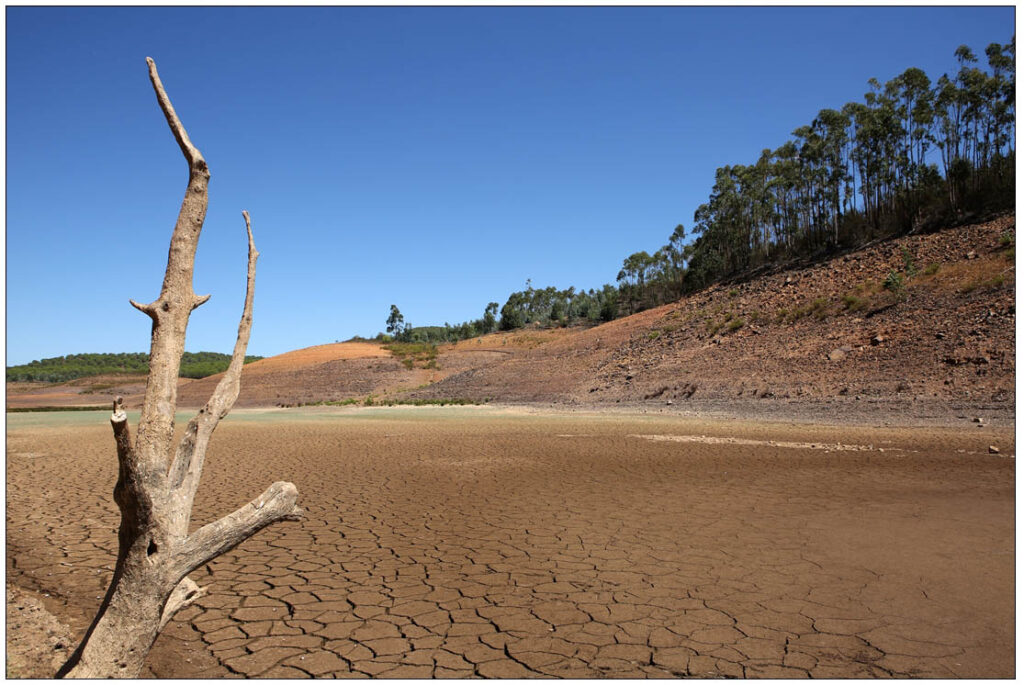Farmers in the Algarve today asked the Government to move quickly from projects to action, claiming solutions already studied for decades to achieve more water availability and mitigate the effects of the drought that affects the region.
During the seminar “Algarve Agriculture talking about… water”, held in Faro, with the presence of Secretary of State for Agriculture Gonçalo Rodrigues, several representatives of regional producer associations reinforced that, if more alternatives are not created, the problems in the sector will get worse.
Macário Correia, former mayor of Tavira and Faro and current president of the Association of Beneficiaries of the Sotavento Algarvio Irrigation Plan, recalled having already participated “in hundreds of meetings to talk about the same subject”, regretting that no one has taken “any decision” so far.
After the completion of the Odelouca dam, in the Western Algarve, in 2009, “the drought became worse” in the region “and no one stored even one liter more”, he said, asking the Government: “resolve the issue of Pomarão and make a decision about Foupana”.
Several Algarve authorities have claimed, in recent years, the connection between the Guadiana river and the Odeleite dam, through a pipeline next to Pomarão, in the municipality of Mértola, Beja district, and the construction of a dam on the Foupana riverside, a tributary of the Guadiana River.
Macário Correia warned that “the production of fruits and vegetables” in Campina de Faro, in the central Algarve, “is at risk, because the [water] tables are low”, adding that Foupana would be essential to solve this problem.
José Oliveira, from AlgarOrange – Association of Citrus Fruit Operators of the Algarve, addressed the same topic, defending the implementation of an irrigation perimeter in the central Algarve, which will only be viable “if there are new possibilities for capturing water”.
“In the area of the Algarve that goes from Algoz [municipality of Silves] to Olhão, irrigation is exclusively from groundwater. If the levels go down there, not to mention if there are problems with saline intrusion, this whole area will remain unresolved”, he warned.
In Barlavento, however, many of the orchards “will not have a chance of survival” and “difficulties are already being experienced in many boreholes”, in addition to the fact that water from the dams “is already out of the question, [since] one is outside the system [Bravura ] and another with rationed water [Arade]”, pointed out José Oliveira.
The leader stressed that “citriculture is facing a dilemma” and that the investments planned under the Recovery and Resilience Plan (PRR), which will only take full effect within four years, will not increase the amount of water for agriculture. .
“The solutions within the PRR, the desalination plant and the [treated] wastewater for agriculture, if it doesn't rain, it won't have any consequences. Water from the desalination plant goes to the hotel sector and water from the ETAR [Wastewater Treatment Station] goes to the golf courses. Agriculture runs out of water”, he noted, foreseeing “critical, very serious problems” if it does not rain “substantially” in the region in the next two years.
The lack of water retention basins in tributaries such as the Quarteira stream and the Vascão stream was also criticized by representatives of producer associations, who reinforced the need for more small dams and weirs to channel water for agricultural crops.
The Secretary of State for Agriculture, who, in the opening session of the seminar, said he wanted to hear the "complaints" of farmers, added to Lusa that "the concerns must all be heard, and then, in a joint and integrated way", “possible solutions” are outlined in view of the known constraints.
“We know that time is short, because the climate is not forgiving and everything that could be an intervention is not always just in the short term”, acknowledged Gonçalo Rodrigues.
The official asked for a “very concrete and tight dialogue”, which would allow reaching investment measures or support instruments to mitigate the problems, and for producers to “continue to be increasingly efficient in the use of water and find alternative solutions to be more sustainable”.
The Minister of Agriculture and Food announced, on May 8, that she had signed the dispatch that recognizes the situation of severe and extreme drought in 40% of the territory nationally, in the south of the country.
On 10 May, the Portuguese Institute of the Sea and Atmosphere announced that the Meteorological drought situation worsened in mainland Portugal in April, with 89% of this territory in drought, 34% of which in severe and extreme drought.



















Comments